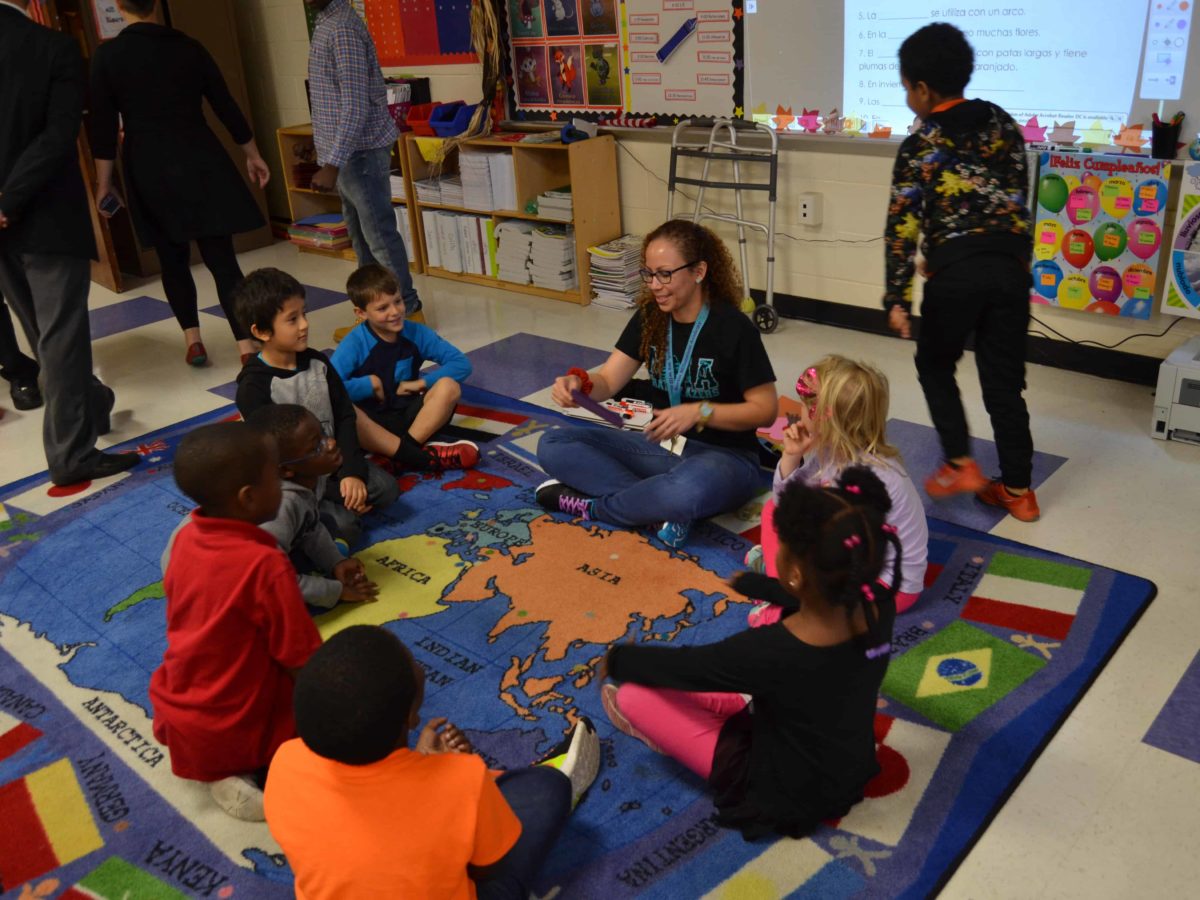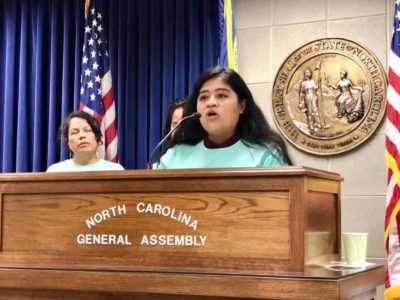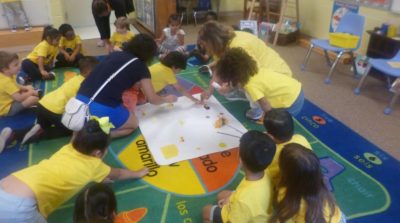
A presidential proclamation and a quirk in how North Carolina’s dual language programs operate are creating a shortage of bilingual teachers for the state. That’s leading to vacancies, restructuring of dual language programs, and even delays in programs starting.
A proclamation from President Donald Trump back in June halted the entry of workers from abroad that the president deemed as a risk to the U.S. economy as it tried to recover from the COVID-19 pandemic. That ban included teachers. The problem for North Carolina is that it has many dual language programs, many of which rely on bilingual teachers from other countries.
There is, however, an exception in the proclamation for state-run programs. But in North Carolina, the largest sponsor of foreign teachers in dual language programs isn’t the state — it’s Participate Learning, a private organization.
David Young, CEO of Participate Learning, says that the state’s programs have been able to make accommodations and keep going for this year, but if the problem extends into next year, it could be a serious issue.
“Regardless of who is in office January 1, if we see the ban continue, that’s going to be a challenge for North Carolina as a whole.” Later, he added: “Without the overturning of the ban, dual language can’t survive.”
What is dual language?
Dual language programs are essentially when students are immersed in another language. There are different varieties. The General Assembly, for the purposes of granting exemptions from state class size restrictions, defined them as “classes in which (i) at least one-third of the students’ dominant language is English and (ii) instruction involves both English and a target foreign language with a minimum of fifty percent (50%) of core content taught in the target foreign language in order to promote dual language proficiency for all students.”
You may be familiar with such programs in a school near you. In North Carolina, there are 47 public school districts, six charter schools, and six independent or private schools with some form of dual language or language immersion programs, according to information from the state Department of Public Instruction. In total, there are more than 200 programs.
The most popular programs in North Carolina are in Spanish. There are 167 of those. The second most popular is Mandarin Chinese. There are 17 of those. But there are also programs in Cherokee, Greek, Urdu, German, Japanese, and French.
Young’s organization started in 1987 with the goal of bringing visiting teachers from other countries to the states. At the time, Participate Learning was called Visiting International Faculty (VIF). As Young describes it, North Carolina was ambitious about its language programs, and his organization began to find teachers from around the world, help them acclimate to the state, learn the system, and get housing — that sort of thing. Over time, Young’s organization became the largest such sponsor in North Carolina.
Dual language programs grew in number and scope, in part because they weren’t just about teaching kids another language.
“Over the years, what we learned was that immersion was more than just a language methodology,” Young said. “It was also an academic approach.”
Students in these programs had improved executive function and cognitive development, and often got higher scores on tests, Young said.
And it’s not just Young saying it. Type in “Dual language program outcomes” and you will see a number of articles and studies. The first hit is from a RAND Corporation study in 2017 titled: “Dual-Language Immersion Programs Raise Student Achievement in English.“
Young says the programs are effective across socioeconomic groups, and in rural, urban, and suburban settings. And these programs can be found in just about every educational setting imaginable: private, traditional public, charter, and religious, according to Young.
As the programs in North Carolina grew, the state became a national leader. And, as we mentioned, they basically rely entirely on international exchange teachers. This is partly because the number of American teachers qualified to teach in such programs is small. But it’s also because part of the purpose behind these programs is to expose students to the cultures of the language they are learning.
The impact
When Trump signed his proclamation in June, the stated goal was to protect American workers. Young said he doesn’t think the impact on dual language programs was intentional.
“What we think has happened is the administration kind of made a wholesale decision to shut down the teacher visa without necessarily having any knowledge or understanding that by shutting down the teacher visa, you’re effectively shutting down or impacting negatively this choice program,” he said.
According to data that Participate Learning keeps about the programs it runs, the impacts from Trump’s decision have ranged in severity. Sixty-eight programs had to make “minor to medium” changes to their programs; 21 had to make major changes; and eight couldn’t keep service going in all grades “and had to either pause the program for a grade level or are relying on a limited number of hours of virtual instruction from a remote teacher,” according to Participate Learning.
Young said that at least 200 teachers were supposed to come into North Carolina this fall. COVID-19 created some logistical challenges surrounding that, but the ban completely cut them off.
Hoke County Schools started a Spanish dual immersion program in one of its elementary schools about seven years ago, according to Donna Thomas, assistant superintendent of human resources for the school system. She said in an email that the decision was made because of all the evidence about how such programs benefit students. The school began its program in kindergarten, adding a new grade level each year. This year the program reached sixth grade.
The new teacher for this year was hired last spring. She was working on getting her J-1 Visa when Trump’s proclamation happened. That delayed her coming to the United States and left the Hoke County school with a vacancy.
The principal of the school had to split the fourth grade dual immersion teacher’s time between fourth and fifth grade to accommodate the vacancy. Meanwhile, because of COVID-19, that same teacher is also having to split her time between face-to-face fourth and fifth grade dual immersion students and online ones, according to Thomas.
Alyn Szymanski, the program choice coordinator for Cabarrus County Schools, said the district’s dual language programs are fast-growing and have a lot of parental interest.
The district offers Mandarin and Spanish in programs that reach about 1,415 students. The proclamation threw a wrench in the district’s plans for this fall.
“We had teachers hired for eight different schools who we found out mid-summer were not going to be able to be brought over to support those programs,” she said.
Amongst other things, the district had to postpone two of its programs as a result.
It could have been worse. When teachers come from abroad to teach in these programs, they are on three-year visas. That can potentially be extended for up to another two years. But after that, the teacher has to go. However, because of COVID-19, a one-year extensions were granted for teachers whose visas were about to expire. This was because of safety issues related to travel and the fact that at the start of the pandemic, it was virtually impossible to get flights or cross many borders.
“Luckily we retained some of the teachers who normally would have had to go home during this window,” Szymanski said.
Gerald Hernandez, principal at E. E. Miller Elementary School in Cumberland County Schools, runs the oldest dual language program in the district. It is Spanish immersion.
He was supposed to get four teachers from abroad for this fall. By chance, one made it in. The other three didn’t.
“This pretty much left vacant positions here at the school, and right now I can say that I’m still not sure of the future of the program because I can only imagine that this going to have long-term effects,” he said.
And Thomas, from Hoke County, said this isn’t just an issue for dual language programs in North Carolina. It can affect other classrooms as well. She said Hoke County had a science teacher who was supposed to start at the district’s early college back in July. The teacher hasn’t made it to the states. And Thomas said that she is hearing similar stories from some of her colleagues around the region.
“The reality is that when it comes to filling teacher vacancies, we have a workforce issue. Our domestic workforce is not currently able to fully meet the demands for qualified teachers,” she said in an email.
What will happen?
Caroline Spencer, director of government relations for Participate Learning, said her organization is trying to get the federal government to grant an exemption from the president’s proclamation so that these dual language teachers can come to the country. She said Participate Learning is working with the North Carolina School Superintendents’ Association and superintendents around the state.
Young said Participate Learning is in touch with North Carolina’s Congressional delegation as well.
“The delegation is aware and supportive of dual language, but I’m not sure that parents across North Carolina understand what’s at play here, what’s at risk,” he said.
Meanwhile, a case in California is challenging the Trump administration’s proclamation. A judge issued a preliminary injunction on the proclamation earlier this month. According to a Forbes.com article, that injunction will stay in place “pending trial,” or unless the injunction is overturned on appeal.
For the time being, teachers overseas can get visas again. According to Spencer, some have been issued, but so far no teachers that Participate Learning works with have made it into North Carolina.
Thomas said she is optimistic they will be able to make it to Hoke County soon.
“We’re very hopeful that they’ll be able to be here by Christmas,” Thomas said.
Meanwhile, dual language programs wait. Young said that the growth and success of North Carolina’s dual language programs necessitated the support of private partners such as his organization. So, with the proclamation exempting programs run through the government in other states, it is as if North Carolina is being punished for its success.
“It’s weird that they would allow for states to continue to run the exact same program but cut off North Carolina who has had the most success with it by using a public/private partnership,” he said.
Behind the Story
In response to inquiries about J-1 Visa issues, the U.S. State Department responded with a link to the exemptions from the president’s proclamation. The State Department representative reached said “I am afraid we don’t have anything more at this time.” The State Department is responsible for visas for foreigners wanting to come to the United States.




